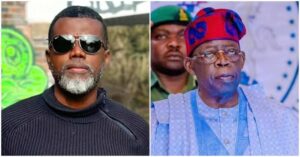Are President Tinubu’s Policies Favoring the Yoruba Over Other Ethnic Groups? – Reno
Are President Tinubu’s Policies Favoring the Yoruba Over Other Ethnic Groups? – Reno

Recently, a wave of articles from disgruntled politicians—mainly those who previously ran for president—has emerged, accusing the Tinubu administration of ethnic favoritism towards the Yoruba people of the Southwest.
These critics, in their bid to incite military intervention, have selectively highlighted positions held by individuals from the Southwest, neglecting to provide a broader perspective that includes representation from other regions.
As British politician George Canning famously noted, “I can prove anything by statistics except the truth.” Let’s focus on the undeniable facts.
Starting with Nigeria’s military and security agencies, which include the Ministry of Defence and a range of law enforcement bodies, we see that there is no overwhelming dominance by the Southwest. Despite the significant number of agencies, critics point to only five appointments from this region as evidence of bias. Does this really indicate favoritism?
Consider the previous administration of President Muhammadu Buhari, where key positions across the executive, legislative, and judicial branches were overwhelmingly held by Northern Muslims. Or reflect on Peter Obi’s campaign, which prominently featured Igbo Christian males leading in various states.
Under President Tinubu, the defense structure has actually gained diversity, as evidenced by the inclusion of a Southeast representative in the Joint Chiefs of Staff for the first time in years.
Now, regarding ministerial appointments, it’s important to note that the Federal Character Commission mandates representation from each state, making it constitutionally impossible for any president to overlook this requirement. Contrary to claims that the Southwest has eleven ministers—counting the president and one from Kwara—this assertion is misleading. The northern regions actually have a significant number of ministers in key ministries, including Defence and Agriculture.
Reforms are underway in Nigeria, such as the landmark Supreme Court ruling that allows local governments to receive direct funding—an important step towards true federalism. Additionally, recent changes in oil revenue management and the removal of fuel subsidies are reshaping the economic landscape, but these moves have also created powerful adversaries for the Tinubu administration.
These opponents have attempted to provoke unrest, failing to incite the anticipated protests and now resorting to allegations of Yoruba dominance—a narrative that exists only in their skewed perceptions.
It’s crucial to discern fact from fiction in these discussions about representation and governance in Nigeria.
TRENDING SONGS
 Shock in Anambra: Bride Disappears Moments Before Wedding
Shock in Anambra: Bride Disappears Moments Before Wedding
 Nigerian Woman Returns ₦330 Million Accidentally Credited to Her Account
Nigerian Woman Returns ₦330 Million Accidentally Credited to Her Account
 APC Don Reach Morocco?’ VeryDarkMan Reacts to Seyi Tinubu Poster
APC Don Reach Morocco?’ VeryDarkMan Reacts to Seyi Tinubu Poster
 Bride Breaks Down in Tears as Wedding Meals Were Kept Secretly While Guests Go Home Hungry
Bride Breaks Down in Tears as Wedding Meals Were Kept Secretly While Guests Go Home Hungry
 Odogwu by Day, Robber by Night: How Marriage Joy Turned Into Tragedy
Odogwu by Day, Robber by Night: How Marriage Joy Turned Into Tragedy
 Nigerian Officials Allegedly Pocket N4–6B Weekly Through Smuggling Cartels at Seme–Badagry Border
Nigerian Officials Allegedly Pocket N4–6B Weekly Through Smuggling Cartels at Seme–Badagry Border
 Ahmad Yerima: Naval Officer to Face No Sanctions After Clash with Wike – Matawalle
Ahmad Yerima: Naval Officer to Face No Sanctions After Clash with Wike – Matawalle
 Trending Video: Muslim Man Joins Wife in Hallelujah Challenge ‘Dress Like Your Miracle’ Night
Trending Video: Muslim Man Joins Wife in Hallelujah Challenge ‘Dress Like Your Miracle’ Night
 Woman Seeks Advice as Late Brother’s Wife Refuses to Mourn Him Following His Death With Alleged Mistress
Woman Seeks Advice as Late Brother’s Wife Refuses to Mourn Him Following His Death With Alleged Mistress
 Nobody Cares About Fine Girls In The UK, I Miss Nigeria — Nigerian Lady Laments
Nobody Cares About Fine Girls In The UK, I Miss Nigeria — Nigerian Lady Laments
Share this post with your friends on ![]()













